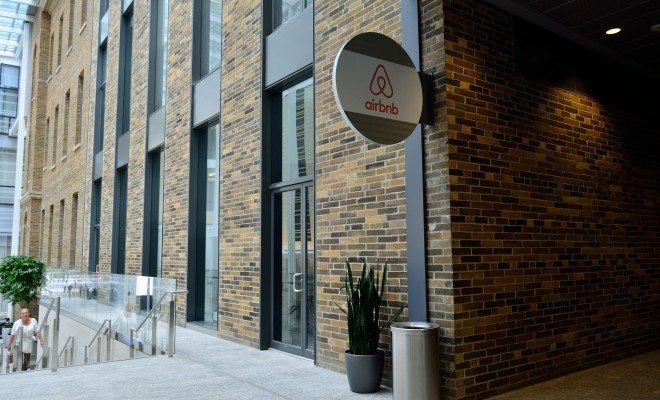 Image Courtesy of [Open Grid Scheduler/Grid Image via Flickr]
Image Courtesy of [Open Grid Scheduler/Grid Image via Flickr]
Business & Economics
Uber, Airbnb: Is the “Sharing Economy” Dangerous?
Companies such as Uber, Lyft, Airbnb, and others are smashing the traditional models of business, making it easy for anyone with a smartphone or Internet access to instantly connect with other people to acquire and share goods and services. This trend has contributed to the creation of the “sharing economy” which is quickly becoming the norm in today’s society.
The sharing economy is formally defined as “an economic model in which individuals are able to borrow or rent assets owned by someone else.” On one hand, this new economy seems to offer flexibility and greater options to consumers, while allowing nearly anyone to participate and benefit; on the other, these companies are often subject to less regulation and scrutiny than traditional businesses.
Uber and Lyft’s taxi-like services jump-started a trend that has spread to start-ups in nearly every industry imaginable including clothing, alcohol, and even, as The Daily Show noted, chickens.
This new trend has the potential to be a major disruptor to the economy, as it has already impacted the way that business is done. The ability to rent nearly anything has made ownership much less desirable, especially for the millennial generation, who make up the majority of participants in this economy. When people have the ability to easily rent just about anything, there is much less need for people to make actual purchases. Additionally, many of the largest-growing companies today don’t directly provide the good or service they sell to their consumer base: Uber does not own the cars it drives, Airbnb does not own the properties it rents, and Grubhub does not make the food it delivers. They simply act as intermediaries to connect goods or services with consumers.
Despite its newfound dominance in the modern world of commerce, the sharing economy is still young and as it continues to expand at such a rapid pace, it may face some growing pains. Many companies are coming under fire for allegedly not obeying the laws set in place for traditional businesses to protect consumers and laborers. Additionally, the prevalent usage of contractors and temporary workers in their business models has led to many criticisms claiming that they lack respect for workers’ rights.
Read on for a look at the biggest issues facing the companies of today’s sharing economy.
Consumer Safety
A major issue facing these startups is whether consumers can trust these companies to provide the same level of safety as traditional businesses. Due to their peer-to-peer model, they are often not held to the same legal and regulatory standards put in place to protect consumers, leading to a litany of criticisms.
Airbnb
Airbnb, a company that allows people to go online and list or rent properties for short-term rental, is an alternative to traditional hotels for people traveling for leisure or business. The company is a major player in the hospitality industry, despite the fact that it doesn’t actually own any hotel properties of its own. A report by PricewaterhouseCoopers found that the company averages nearly 22 percent more guests per night than Hilton Worldwide.
However, critics are concerned about the safety procedures put in place by Airbnb. The service allows virtually anyone to put up a listing and become a host, and they do not routinely perform background checks on users. The company explains, however, that it has features in place to ensure safety, such as user reviews and a Verified ID process (in which identification is confirmed through a government-issued ID or social media profile). Still, the question remains, is that enough to ensure that both hosts and guests will have a safe experience?
This issue was put in a spotlight last month in a piece published by Matter, in which the author Zak Stone gave an account of his father’s death in a freak accident involving a rope swing in a Texas Airbnb rental. Stone’s piece is an extensive look at the legal and ethical controversies surrounding Airbnb, and includes stories such as one of a woman who died from carbon monoxide in a Taiwanese property. These stories highlight a large concern with the Airbnb business model, which is that the company cannot necessarily hold its listed properties to the same standard as a major hotel chain can with its properties. While hotels must operate under legal and regulatory standards, there are less restrictions on which properties can be posted. Whether user ratings are enough to ensure quality and safety for guests is an issue that can be debated.
Additionally, hosts cannot always be assured by the fact that their guests are trustworthy and will take care of their property. To address this, the company does offer Host Protection Insurance that protects against liability claims liability claims up to $1 million. However, anyone who chooses to become an Airbnb host would presumably be aware that they are agreeing to undertake a certain level of risk by letting a stranger stay in their property.
Uber and Lyft
The safety concerns that plague Airbnb can also extend to ride-sharing services such as Uber or Lyft. In order to become a driver with one of these services, drivers must pass a background check, in addition to holding a driver’s license and meeting the minimum age of 21. Cars are not maintained by the companies, but must possess a certain level of insurance in order to operate. Despite this, there is a long list of incidents such as assaults, attempted kidnappings, and driver DUIs, among others. There are also allegations that the background checks are not extensive enough, and as such, they are more likely than taxi services to have such incidents take place.
However, taxi drivers have also been accused of similar offenses, so it seems that this issue is not unique to ride-sharing companies. A Cato Institute study found that ride-sharing companies were just as safe as traditional taxis, and also claimed that background checks for such companies often had stricter requirements than those for cabs in the U.S.’s biggest cities. Additionally, users of Uber and Lyft have the personal information of the driver on their phone, making it easier to report incidents (and the same is true if a driver is attacked by a passenger).
Labor Issues
Companies involved in the sharing economy have been held responsible for the emergence of the “gig economy,” which relies on contractors to make up the majority of its workforce. Because of this, they are not offered benefits such as health insurance and vacation. In fact, both Uber and Lyft are facing lawsuits for the “misclassification of drivers” in order to save on labor costs. Because they classify workers as contractors, federal law does not let them form unions to advocate for fairer treatment. Additionally, as noted earlier, drivers are required to use their own car, smartphone, and insurance in order to operate. This may affect the ability of lower-income workers to be able to participate in the first place.
Get More: Comedy Central,Funny Videos,Funny TV Shows
Some may argue that Uber workers are not typically full-time drivers; they often hold other jobs and drive to make some extra money on the side. As such, do these companies need to be concerned about providing them with benefits? It is true that the vast majority of drivers fall in the 18-to-24 age group, and over half of drivers are part-timers. However, Uber and Lyft have been responsible for affecting the businesses of traditional taxi drivers who often do make their living off of their profession. The majority of New York taxi drivers are immigrants, with the median falling in the 50-54 age range. The disruption of car-sharing services on traditional taxi services has been immense, causing taxi drivers all over the world to protest Uber.
Another problem sharing economy startups bring to the forefront is whether or not their models will hinder future job growth. If apps and websites can eventually take over jobs done by people, what effects will this have on the future of the job market?
In a segment on his show, Bill Maher lamented that this sharing economy is a reflection of societal greed, and will lead to greater income inequality because it will decrease the number of jobs available. These concerns, however, are more so related to technological progress rather than directly the result of the sharing economy, so it seems unreasonable to blame the sharing economy. Hillary Clinton also cited the gig economy as dampening wage growth in the U.S., and “raising hard questions about workplace protections and what a good job will look like in the future.”
Conclusion
There is no doubt that the sharing economy has had a tremendous impact on the way that business is done, and will continue to do so for the foreseeable future. Many are still skeptical of this system because it is based on trust, and it is difficult to hold this trust without being ensured that your interests are protected by the law. The traditional legal system hasn’t caught up to these non-traditional ways of doing business, but as this business model becomes more and more prevalent, companies will need to continue to put regulations and protections in place for consumers and laborers.
Resources
Primary
PriceWaterhouseCoopers: Consumer Intelligence Series-“The Sharing Economy”
Additional
Medium: Living and Dying on Airbnb
U.S. News and World Report: Who’s a Sharing Economy Worker?
The Seattle Times: The ‘Shared Economy’ is Further Hurting Workers’ Rights
The Guardian: Uber and the Lawlessness of ‘Sharing Economy’ Corporates








Comments